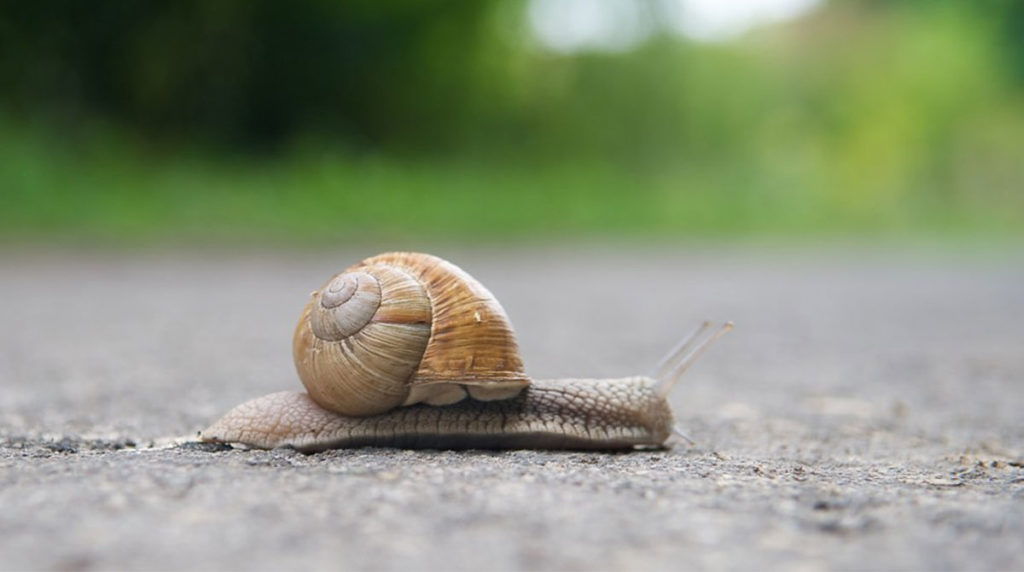
What do a snail crossing a road and a rock in the middle of it have in common? Not intuition, not sentience, not life, even. The snail I was contemplating as it slowly breached the double white line had all three of these attributes, for the moment, but the rock, a foot or so ahead in its path, had none of them. Nevertheless, as I looked from the snail to the rock, I felt certain the rock had a shoulder up, as if ready to ward off blows, and I felt a twinge of regret at not knowing what challenges a rock faces.
The snail meanwhile was studiously avoiding eye contact. All four antennae—called horns in Spanish, cuernos—were pointing the way forward, and the pull on them as if from a magnet seemed to draw the body along behind. On a snail, two are eye stalks and the other two are olfactory organs, and this snail was following its nose, as people do. The rock sat still, not stupid but ever so remote, lost in its own environs of seething chemicals and minerals. Chunky little fellows both, despite the differences. Had a car come along, though, I’d have worried more about the snail than the rock, as if it had a stronger claim on my sympathy. But maybe that’s not a reflection on their relative worth, but on their vulnerability. For the same reason we worry more about children than adults: not because children are morally superior but because despite their famed resilience, they are more susceptible to harm. They aren’t as hardened as adults can be, and they haven’t yet developed much of a shell.
Nevertheless, as I watched the one whose progress was easy for me to track and the other whose progress I had no way of judging, I felt a kinship with both. It was a kinship based not on thinking alike, or acting alike, or on feeling the same way, but on shared existence. Here we three were, stuck in this world, all of us destined to transform, although at very different speeds and in different ways: lose consciousness and selfhood, die, crack, crumble, erode. To change, in a word, to stop being one thing to become another. I had decades left in my present form, according to charts, but what about them? I wondered, and I worried.
At a time when intelligence was often the crucial consideration in according rights to beings other than humans, the philosopher Jeremy Bentham wrote, “The question is not, Can they reason? nor, Can they talk? but, Can they suffer?” He went further, writing, “Why should the law refuse its protection to any sensitive being? The time will come when humanity extends its mantle over everything which breathes.”
Why stop there? In addition to all the things that breathe, there exist the things that simply are. Could we not extend the mantle of responsibility over everything that is?
I like to imagine such a broad welfare movement. Not just for classes of people or just for intelligent animals or even all animals, but for things, too. To qualify you need not have sentience but existence. Those to be rescued would be not just mistreated animals but mistreated objects—the ones tossed out on garbage heaps, the ones thrown into the oceans, the ones bulldozed under or scattered to the winds. Everything that is disrespected, disregarded, undervalued, not considered.
The snail crept on, slowly gliding, welling over minuscule pieces of gravel with no apparent concern for their feelings. For their existence even. But exist they did, and after the snail’s passing their existence was to me a wetter, shinier, messier, and more interesting existence. Those bits of gravel had a new quality, individuality, which might be as good as life, maybe better for anyone thinking long term.
As for the rock, it had shifted with the light and dropped a shoulder. Did that mean it felt safer? The rock did not say.


